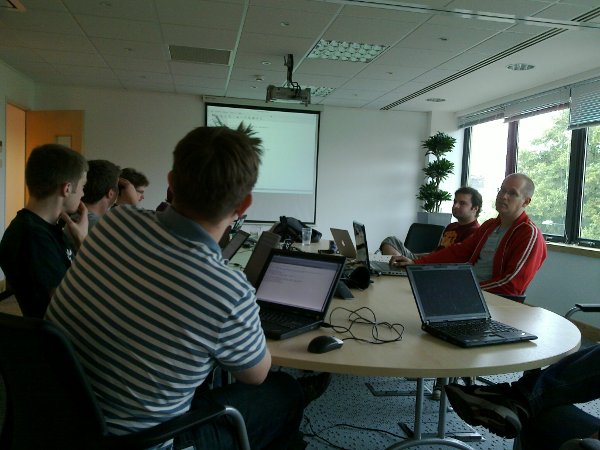Updated my own and my wifes computers yesterday to latest Fedora version, which included an upgrade to GNOME 3. Have to say I am quite impressed with it so far, I mean it is definitely a .0 release with a lot of little issues (like not remembering how to deal with my dual screen setup at work). But apart from that it feels pretty sweet, especially like the messaging integration into the desktop. It still got quite a few issues though, but here at Collabora we now have Jonny Lamb and Guillame Desmottes helping out with trying to polish it up.
The biggest change I found that was that of the attitude of my wife, she went from “linux sucks, why do I have to use this stuff” to “this is actually quite cool”.
So a big congrats to the GNOME 3 team for a wonderful release! I am looking forward to seeing how it develops in the coming Months.
I am generally impressed by all the nice work being done across a lot of projects these days, helping to make sure we have a really powerful and nicely integrated platform. It wasn’t that long ago the linux desktop (and server for that matter) felt like a taped together collection of stuff, but for each new release it seems the ease of use and polish increase, with good integration happening between all major layers. Efforts to drain the swamp, like systemd, does make a huge difference over time and draws us ever closer to the goal set when GNOME 2 was being created, remove the need to have configure options in the user interface to make the system ‘work’. If you need to enter a configuration menu to have basic functionality work, then that is a bug, not a feature.
I think there has been a general change in philosophy happening over the last 5-6 years, where we moved from everyone trying to fix the world in their own corner, to people instead trying to work together. For instance in GStreamer we have moved from trying to fix the problem by supporting every sound system under the sun, and instead try to work closely with the best solution out there to actually solve the problems people have, which is why people like GStreamer maintainer Wim Taymans have also been contributing to Pulse Audio over the last year. Enabling people to switch backends between ALSA, OSS, Sun Audio or Pulse Audio isn’t a solution, is it exposing a bug. So while the plugins supporting all those systems are still there of course, as they are useful for people in various situations, I think our thinking now is that when we find an issue that is best solved in Pulse Audio, as opposed to GStreamer, we solve it in Pulse Audio, instead of trying to make a second rate solution in GStreamer itself. And if there is a feature missing in Pulse Audio the solution is not to add an option in the user interface to ALSA, it is to add the feature to Pulse Audio. There are of course still cases where we need to support multiple plugins offering the same functionality of course, codecs being the best example, but if we want to make the open source ecosystem better we need to all focus on making things work well without needing the user to reconfigure which libraries and backends they use for a given task.
Seeing all this other great efforts move forward to plug the remaining holes I am also happy to say that by the end of the year we should have GStreamer 1.0 out the door, Wim Taymans is putting the foundations together as we speak. It should provide a lot of great improvements to GStreamer, like good solutions for handling 3D video for instance, but also provide a lot of speed improvements which will be especially useful for embedded setups (allthough I haven’t met a desktop user so far who hates getting faster software either.)

